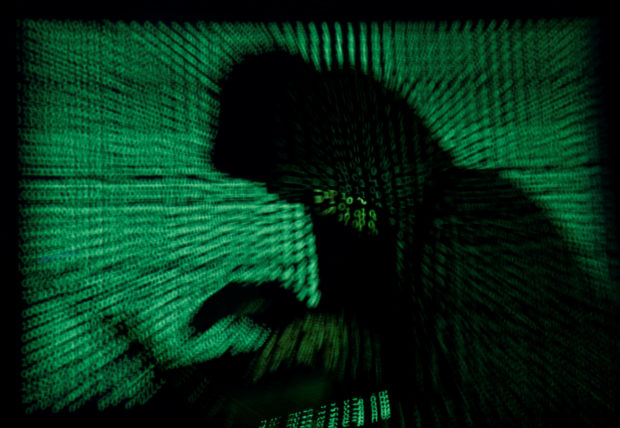
A hooded man holds a laptop computer as cyber code is projected on him in this illustration picture taken on May 13, 2017. (File photo by KAEPER PEMPEL / Illustration / Reuters)
MANILA, Philippines — “Cybersecurity must be treated as a matter of national security,” Dindo Manhit, president of Stratbase Albert del Rosario Institute, said at a recent forum that the institute organized in partnership with the US Embassy in the Philippines.
Manhit was among the cyber defense and geopolitical experts who urged President Ferdinand Marcos Jr. to boost the Philippines’ cybersecurity in cooperation with the private sector and allied countries in the Indo-Pacific region, according to a statement about the forum that was issued on Tuesday.
“The country’s digital infrastructure needs to be strengthened as a result of the ongoing exposure to cyber threats, thus policies and initiatives must be developed and put into action,” Manhit said.
“Only by creating a strong and credible cyber defense posture will the Philippines and Indo-Pacific be able to achieve a secure and trustworthy digital community,” he added.
Another forum participant was Dan Ennis, former director of the Threats Operation Center of the US National Security Agency. He also stressed that a partnership between the government and the private sector was key in fighting cybercrimes.
“The biggest strategy you can do, from my perspective, to defeat cybercrime is by sector, by entity, by company, by government agency, by wherever you sit. Set a set of priorities that you will focus on and then communicate those priorities again and again and again. They may change over time, but that communication will do a lot of good, both in helping defend and helping our public gain confidence that we know what we’re doing both in the government and in the private sector,” Ennis said.
Paolo Pascetta, program manager of the US Cybersecurity and Infrastructure Security Agency (CIDA), gave an assurance the US gives “paramount importance” to its treaty allies in the Indo-Pacific regions in fighting threats posed by state and non-state actors.
In fact, Pascetta said CISA was planning to hold training sessions on cyber hygiene and cyber workforce development in Manila in early 2023.
Francisco Domingo, assistant professor of International Studies at De La Salle University, shared similar sentiments. He urged the national government to strengthen the National Security Cybersecurity Plan by including the Department of Foreign Affairs in the framework.
“I argue that if we’re facing, let’s be blunt, Chinese cyber operations, the logical strategy is to leverage our alliance because we already have it. Whether the treaty covers cyber is still in a gray area, but it does not mean that we can’t focus on capacity building, we can’t focus on exercises, and we can’t focus on diplomacy,” Domingo said.
The Department of Information and Communications Technology (DICT) then said that it had already started pursuing public-private partnerships to secure Philippine cyberspace despite cuts in the 2023 budget.
The National Bureau of Investigation earlier said that reports of phishing cases that it received in 2020 increased by more than 200%.
The Cybercrime Office of the Department of Justice also reported a 264% increase in the number of reported online sexual exploitation of children from March to June 2020 alone.
A 2021 survey by Cybersecurity firm Sophos also showed that 69% of Philippine organizations experienced ransomware attacks in 2021. The Bangko Sentral ng Pilipinas also reported receiving 42,000 complaints related to online transactions in 2020-2021, amounting to P540 Million.
Citing a poll conducted in 2021by cybersecurity company Sophos, Stratbase said that 69% of Philippine firms were the target of ransomware attacks.